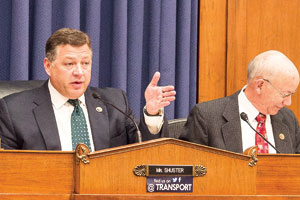Senior Reporter
Hill Transportation Leaders Re-Elected, Pledge to Craft Long-Term Highway Bill

This story appears in the Nov. 14 print edition of Transport Topics.
The re-election of senior Republicans on Nov. 8, solidifying the party’s control of the U.S. House of Representatives and the Senate, is expected to help Republicans unify the divisions within their party and approve a long-term funding fix for freight infrastructure projects next year, the incumbent lawmakers and GOP leaders said.
Chairman of the House transportation panel, Rep. Bill Shuster (R-Pa.) and senior Commerce Committee member, Sen. Roy Blunt, from Missouri, fended off strong election opponents partly by touting their expertise in freight transportation affairs. The two lieutenants for House and Senate leaders, respectively, will be called upon to galvanize support for a sustainable funding plan for highway programs and push back on trucking regulations adopted during the Obama White House years.
“Throughout the general election, one of the few issues that provided common ground was the need for investments in America’s transportation network and infrastructure,” said Shuster, two days after defeating a tea party-backed candid- ate in one of the country’s most closely watched races. “With the results of Tuesday’s historic election now coming into focus, we have a unique opportunity to begin this work immediately by embracing innovative ideas and approaches to improving our infrastructure.”
Blunt also expressed a need for Republicans to dismiss the intraparty feuding that marked the past six years and to unite behind President-elect Donald Trump, as well as, Paul Ryan (R-Wis.), the speaker of the House, and Mitch McConnell (R-Ky.), the majority leader in the Senate.
“A Republican president, a Republican Senate and a Republican House can do things to change this country and focus again on opportunity,” said Blunt, who held his ground against Jason Kander’s assault to win a second term. Blunt captured 49% of the vote to Kander’s 46% in a four-way race. Kander is the Democratic secretary of State in Missouri.
Soon after the elections, Ryan and McConnell expressed optimism over Trump’s upcoming collaboration with a Republican-led Congress. The GOP leaders have pledged to prioritize funding for freight connectivity projects, primarily through Ryan’s efforts to proceed with a tax reform package to offset infrastructure funding in the spring.
“The key is not only to unify and merge the approaches that invite everyone in the country to get focused on the solution … the opportunity is to go big, bold and get things done,” Ryan told reporters.
Before the elections, Shuster acknowledged to Transport Topics that Ryan’s plan would look to provide a long-term funding supplement for the federal Highway Trust Fund.
In rural southwestern Pennsylvania’s 9th District, Shuster won a ninth term by winning 63% of the vote. His Democratic rival, Art Halvorson, collected 37%, the Associated Press reported. Shuster quickly declared his allegiance to Trump and promoted his legislative résumé.
Since the start of his chairmanship in 2013, the transportation panel has advanced infrastructure reform bills and a historic five-year highway bill that Obama signed into law in December. The FAST Act authorized additional funding for projects that advance freight connectivity projects.
The fundraising advantage went Shuster’s way. He outraised Halvorson by more than $3 million. Transportation and freight industries strongly supported Shuster’s candidacy.
In the battle for Missouri, Blunt, reminded constituents he had assisted in reforming regulations for the trucking industry in the FAST Act.
Blunt also was instrumental in encouraging additional review of hours-of-service rules for truckers. The trucking sector saw value in his re-election, giving his campaign committee $101,600, according to the Center for Responsive Politics.
Owner-Operator Independent Drivers Association Executive Vice President Todd Spencer told Transport Topics his group needs Capitol Hill lawmakers next year to undo regulations.
“The issues for us don’t change much, regardless of who is in office,” Spencer said. “On the regulatory front, we are attacked by both sides. If we want regulators to treat small-business truckers fairly, we will have to fight to get that through to them.”
Assisting Shuster on the transportation policy panel will be Rep. Jeff Denham (R-Calif.) who defeated Michael Eggman, a Democrat, by 52% to 48%. Denham’s win guarantees him a return to the chairmanship of the railroads subcommittee where he oversees freight safety policy.
After winning the 10th District in 2010, Denham moved to position himself as the heir apparent to Shuster as full committee chairman.
Last year, Denham aggressively advanced proposals that would block states from enacting requirements related to meal and rest breaks for truckers. The trucking industry backed the incumbent with $108,350 for his campaign committee, the Center for Responsive Politics noted.
Notably, former Florida Gov. Charlie Crist, the Republican turned Democrat, won 52% of the vote to beat freshman Rep. David Jolly (R-Fla.), who had key seats on the transportation funding and policy committees. And relatively unknown Democratic newcomer Stephanie Murphy knocked out longtime Republican gadfly John Mica, formerly chairman of the Transportation and Infrastructure Committee.
In defeating Mica, Murphy’s margin of victory was 51% to 49%, the Associated Press reported.

